
* * * * * * * * * *
| Islamabad |
| 14 May 2013 |
| GEM mission urges ECP to declare polls Null, VOLD |
| |
|
|
|
 |
 |
 |
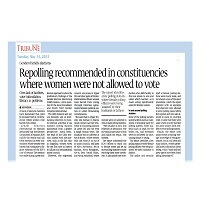 |
PRELIMINARY STATEMENT GEM OBSERVATION MISSION
On the 11th of May 2013 the GEM observation mission from Gender Concerns International in partnership with the Aurat Foundation, sent out 110 observers in Pakistan,to monitor election activities from gender perspective throughout the day at 555 women polling stations in major cities of Pakistan.The experience of international and domestic observers was mixed together in order to obtain a maximum result. Election monitoring was undertaken in Islamabad, Rawalpindi, Lahore, Karachi, Peshawar, Swabi, Kohat, Swat, Abbottabad, Mardan, Lower Dir, Hyderabad, Thatta, Sargodha, Bhakkar, Vehari and Gujranwala.
Thanks to the grassrootworking of the Aurat Foundation, the mission succeeded in reaching out far into the country .
In this Preliminary Report, the following findings can be highlighted:
| 1. |
Determination and joy
Despite violent pre election times, threats and attacks, female voters turned out in big numbers often present from the beginning, very enthusiastic, including old age, middle age, youth, mothers with babies and children, disabled women , coming along with their families, neighbourhoods or friends.Standing in cues from 8 am to 5 pm , at closing time a lot of women were still in line.Given the circumstances, the tenacity of women was amazing When the ECP extended votingtime, women took benefit and hurried to the PS to cast their vote at the last moment which showed their interest in the political system . A lot of female voters made a great effort to cover a distance when they were confronted with the fact that they were not registered in a close by Polling station , which clearly showed their determination to vote. In Sragodha, women voted for the first time in history in union councils Lilliani and Moazamabad. |
| 2. |
But also obstruction and violation of electoral code
In some pollingstations political agents took over the organisation and tried to ‘guide’ the female voters. In others campaigning was going on inside pollingstations, showing clearly party signs, wearing Tshirts, serving tea and even a sticker was noticed of a political party on a polling booth. According to ECP, no transport was allowed by parties but this was violated all over. Voters reported being offered money to vote for a certain party. In Upper Dir and Khyber Pakhtunkhwa women were barred from voting through political party agreements or under threatening circumstances.In Upper Dirit was the case in the entire district and only one woman was able to cast her vote in UC Darora. In Lower Dir women were stopped from voting in seven constituencies, and in Buner district women were not allowed to vote in 17 UCs. Women were also barred to vote in several constituencies in Mardan, D.I.Khan, Nowshera, Batagram and Malakand. |
The constituencies where women were stopped from casting vote en masse are:
S.No |
District |
NA |
PA |
UC/Poling station |
Status |
1 |
Upper Dir |
33 |
91-93 |
All UCs |
women were barred in all UCs, only one woman cast her vote in UC Darora |
2 |
Lower Dir |
34 |
91 |
Nafasa |
Women were not allowed to cast their vote |
|
|
|
|
Kamangarah |
Women were not allowed to cast their vote |
|
|
|
|
Bajwaro |
Women were not allowed to cast their vote |
|
|
|
|
Pato |
Women were not allowed to cast their vote |
|
|
|
|
Bankot |
Women were not allowed to cast their vote |
|
|
|
|
Sari |
Women were not allowed to cast their vote |
|
|
|
|
Ouch |
Nuzhat Begum (a candidate) cast her vote |
3 |
Buner |
28 |
77-79 |
17 Ucs |
Among 27 UCs women didn’t cast their vote in 17 UCS |
4 |
Mardan |
10 |
28 |
Kotki |
Women were not allowed to cast their vote |
|
|
10 |
28 |
Katlung |
Women were not allowed to cast their vote |
5 |
D.I. Khan |
25 |
67 |
Garah Essa Khail |
Women were not allowed to cast their vote |
6 |
Nowshera |
5 |
12 |
Choki mumraiz |
Women were not allowed to cast their vote |
7 |
Batagaram |
22 |
59 |
Ajmera |
|
Women were not allowed to cast their vote |
8 |
Malakand |
35 |
98 |
Govt Degree College, Govt High School Dargai |
Women were not allowed to cast their vote |
|
|
35 |
98 |
Heroshah, Haryan Kot |
Women did not allowed to cast their vote |
|
|
35 |
98 |
Primary school Nary Obo |
Women were not allowed to cast their vote |
| 3. |
A great job done by ECP
Although we regret that ECP is an ‘all men’s club’ , we do recognize that ECPdid an enormous effort to reach out to female voters and to set up as many polling stations so that women did not have to cover great distances (the 2km rule). The introduction of SMSfacility to find out where to vote and under which number, was very successful with literate and young women. However illiterate women and women from more rural areas remained dependant on political party camps to get their polling station location, block code and serial number. Polling staff often refused voters presenting themselves without serial number and as cellphones were in many cases not allowed inside, female voters were then sent back to the party camps to get that information . |
| 4. |
In and outside the pollingstations
Although there were more pollingstations closer to the women’s homes, the facility itself often was not up to mark. We noticed many PS that really were too small , where there was no place for observers and partyagents to sit and where it was burning hot inside. Moreover this prevented privacy for the voters. In another place severalmixed pollingstations were all in one room which led to complete chaos. The complaints of inadequate physical space within the polling booths were received from most of the polling stations .There were no wash rooms for polling staff as well as women voters at most of the stations. . Water was not provided.
In some PS furniture was not sufficient and comfortableenough to sit on all day. In some pollingstations (for instance in Karachi )material was very late and also lacking at some places e.g. seals for the boxes, ink, envelopes , extra white boxes.. (normally material should be delivered the day before, in some cases it was at 11pm..)
No sitting areas were foreseen for older , disabled or pregnant women . As cueing often took many hours in the sun , this led to fainting, sickness, throwing up.. A disabled woman presented herself in a pollingstation in Lahore at 9 o’clock but could not enter the PS on the first floor, she was asked to come back at 12, again she was refused, she came back at 6.30pm and then finally they got the ballotbox down so she could cast her vote.
ECP’s decision to move away party camps from the close-by premises of the polling stations helped in improving the overall physical environment of congestion previously witnessed in elections outside the polling stations and also inside the stations. However, the presence of male volunteers of political parties was witnessed near entry points at almost all polling stations which made entry into these polling stations little uneasy. |
| 5. |
Polling staff
In female PS, we mostly found female staff, although in some cases, husband or father was ‘assisting’the female presiding officer . There were male presiding officers at several combined polling stations and several women polling stations in Karachi. Although training was supposed to have been given to all staff, in several places we noticed flaws in the procedure: ballotpapers not stamped, pollingbooths not placed to guarantee secrecy, allowing unauthorized persons ..
The new procedure of counting women and men’s ballotpapers
separately in order to obtain sexsegregated data, is encouraging for calculating women’s turnout.
The extension of the votingtime by EPC at the end of the day was not received in time by several presiding officers which caused frustration and chaos : women presenting themselves at 5.30pm found the pollingstation already closed and ballot boxes sealed which had to be sorted out with difficulty. |
| 6. |
Security
Police and security often male was found in female pollingstations .Women police personnel were seen only at a few places. They were not always aware of exact procedures.For instance that observers could enter before opening, that they could assist counting . Also party agents could not attend counting in some cases.
In some cases security did not allow women with kids to enter which caused a lot of trouble. |
| 7. |
Voters’education
Women voters’ knowledge about vote-casting procedure was of average nature in urban centres, however, in rural areas and in rural suburbs of cities women generally lacked information about voting. Shrewd party agents often took advantage of this. |
| 8. |
Media
The media played a great role in giving women their rightful place. They were a great help in voters’ education and gave a forum to women candidates. They highlighted difficulties and injustices regarding women and gave a voice to those who are often voiceless. |
| |
CONCLUSION
All over it was heartwarming that women in Pakistan refused to bow down and time and time again said they would not give up until they were able to vote .
Out of respect for all these courageous women who stand up for free and fair elections , even in the most barren circumstances, our main revendication remains that we call upon the ECP to declare elections null and void elections in these constituencies where women were barred from voting due to this flagrant violation of election rules and code of conduct.A country that neglects its women, neglects its future! |
* * * * * * * * * *
| Islamabad |
| 12 May 2013 |
| Aurat Foundation rejects election results from some constituencies |
| |
|
|
 |
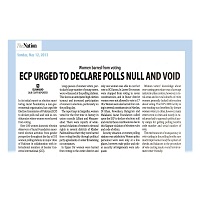 |
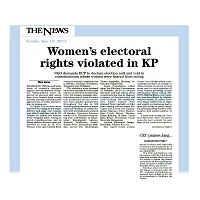 |
Islamabad
11 May 2013 (09:30 pm.)
Aurat Foundation urges ECP to declare polls null and void
in constituencies where women were barred from voting
Islamabad: Over 100 women domestic election observers of Aurat Foundation monitored election activities from gender perspective throughout the day at 553 women polling stations in major cities of Pakistan in collaboration with international monitors of Gender Concerns International (GCI). Election monitoring was undertaken in Islamabad, Rawalpindi, Lahore, Karachi, Peshawar, Swabi, Kohat, Swat, Abbottabad, Mardan, Lower Dir, Hyderabad, Thatta, Sargodha, Bhakkar, Vehari and Gujranwala.
Aurat Foundation and GCI will issue a preliminary report on their mission on 13 May 2013. Some of the initial findings of Gender Election Monitoring (GEM) Mission are:
| 1. |
Voting for General Elections 2013 remained peaceful and orderly by and large in the country except for a few untoward incidents. |
| 2. |
Long queues of women voters, particularly large number of young voters, were witnessed at the polling stations. This shows an anticipated high election turnout and increased participation of women in elections, particularly on the polling day. In Sragodha, women voted for the first time in history in union councils Lilliani and Moazamabad. |
| 3. |
There were reports of widespread violations of women’s electoral rights in several districts of Khyber Pakhtunkhwa where they were barred from voting forcibly through political party agreements or under threatening circumstances. In Upper Dir women were barred from voting in the entire district and only one woman was able to cast her vote in UC Darora. In Lower Dir women were stopped from voting in seven constituencies, and in Buner district women were not allowed to vote in 17 UCs. Women were also barred to vote in several constituencies in Mardan, D.I.Khan, Nowshera, Batagram and Malakand. |
| |
Aurat Foundation called upon the ECP to declare elections null and void elections in these constituencies due to this flagrant violation of election rules and code of ethics. The constituencies where women were stopped from casting vote en masse are: |
S. No |
District |
NA |
PA |
UC/Poling station |
Status |
1 |
Upper Dir |
33 |
91-93 |
All UCs |
women were barred in all UCs, only one woman cast her vote in UC Darora |
2 |
Lower Dir |
34 |
91 |
Nafasa |
Women were not allowed to cast their vote |
|
|
|
|
Kamangarah |
Women were not allowed to cast their vote |
|
|
|
|
Bajwaro |
Women were not allowed to cast their vote |
|
|
|
|
Pato |
Women were not allowed to cast their vote |
|
|
|
|
Bankot |
Women were not allowed to cast their vote |
|
|
|
|
Sari |
Women were not allowed to cast their vote |
|
|
|
|
Ouch |
Nuzhat Begum (a candidate) cast her vote |
3 |
Buner |
28 |
77-79 |
17 Ucs |
Among 27 UCs women didn’t cast their vote in 17 UCS |
4 |
Mardan |
10 |
28 |
Kotki |
Women were not allowed to cast their vote |
|
|
10 |
28 |
Katlung |
Women were not allowed to cast their vote |
5 |
D.I. Khan |
25 |
67 |
Garah Essa Khail |
Women were not allowed to cast their vote |
6 |
Nowshera |
5 |
12 |
Choki mumraiz |
Women were not allowed to cast their vote |
7 |
Batagaram |
22 |
59 |
Ajmera |
Women were not allowed to cast their vote |
8 |
Malakand |
35 |
98 |
Govt Degree College, Govt High School Dargai |
Women were not allowed to cast their vote |
|
|
35 |
98 |
Heroshah, Haryan Kot |
Women did not allowed to cast their vote |
|
|
35 |
98 |
Primary school Nary Obo |
Women were not allowed to cast their vote |
| 4. |
Security situation at women polling stations was satisfactory. Women police personnel were seen only at a few places, however, male police and other security arrangements were adequate. |
| 5. |
Women voters’ knowledge about vote-casting procedure was of average nature in urban centres, however, in rural areas and in rural suburbs of cities women generally lacked information about voting. The ECP’s SMS facility in vote tracking was benefitted by literate women voters, in cities, however, many voters even in cities and mostly in rural areas had to approach political party camps for getting polling booth’s code number and serial number of vote. |
| 6. |
The environment of transparency in vote-casting in the polling booths saw much improvement and the system of checks and balances in the procedure of vote-casting made overall environment voter-friendly. |
| 7. |
The complaints of inadequate physical space within the polling booths were received from most of the polling stations and rooms were filled with women voters at the peak hours which created chaos. There were no wash rooms for polling staff as well as women voters at most of the stations. |
| 8. |
Location of women polling stations was reachable by voters and no major complaints were received at the polling stations visited by the election monitors, except for some rural constituencies. |
| 9. |
The polling staff was cooperative, however many were inexperienced and their strength at many polling stations was inadequate. Polling staff at most women polling stations was female but there were male presiding officers at several combined polling stations and several polling women polling stations in Karachi. Several polling stations in Karachi and Khyber Pakhtunkhwa also complained of insufficient election material. |
| 10. |
ECP’s decision to move away party camps from the close-by premises of the polling stations helped in improving the overall physical environment of congestion previously witnessed in elections outside the polling stations and also inside the stations. However, the presence of male volunteers of political parties was witnessed near entry points at almost all polling stations which made entry into these polling stations little uneasy.
|
| 11. |
ECP’s decision to ban transportation of voters by candidates did not seem to have any impact and political parties and candidates were seen transporting them freely in private and public vehicles. |
* * * * * * * * * *
Activities/Monitoring
| |
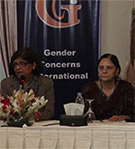 |
09 May, 2013
Pre-Election Statement Gender Election Monitoring Mission (GEM) Election 2013 Pakistan
|
Gender Concerns International (GCI) in partnership with Aurat Foundation has launched its Gender Election Monitoring Mission in Pakistan. |
| |
|
Read More |
|
|
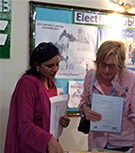 |
08 May, 2013
GEM Mission meet AF staff at Lahore
|
AF staff meets Ms Magda De Meyer, Deputy Head of the GEM Mission, on 8th May 2013, at AF Lahore office. |
| |
|
Read More |
|
|
| |
|
|
|
|
| |
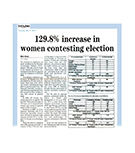 |
07 May, 2013
129.8% increase in women contesting election
|
ISLAMABAD: The final list of candidates, as made available by the Election Commission Pakistan (ECP), depicts 129.8 per cent increase in the number of women contesting election 2013 on general seats as compared to elections 2008. |
| |
|
Read More |
|
|
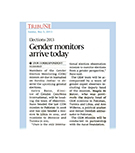 |
03 May, 2013
Gender Concerns International & Aurat Foundation deploys international and national observers to observe Elections 2013 on 11 May
|
Gender Concerns International kindly thanks the Ministry of Foreign Affairs of Pakistan for welcoming their Gender Election Monitoring (GEM) Mission.
|
| |
|
Read More |
|
|
| |
|
|
|
|
| |
 |
02 May, 2013
Pamphlets distributed in Qalat threatening peoples ‘don’t cast vote’
|
According to a news published in Urdu daily Jang, Quetta, a Baloch resistance organization distributed pamphlets threatening peoples to stay away from election and voting;
|
| |
|
Read More |
|
|
| |
01 May, 2013
Civil society condemns attacks on secular parties
|
Members of the civil society have expressed their solidarity with the Muttahida Qaumi Movement, Awami National Party and Pakistan Peoples Party by condemning the bomb attacks on their offices and workers.
|
| |
|
Read More |
|
|
| |
|
|
|
|
| |
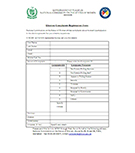 |
26 April, 2013
'NCSW established election complaint cell'
|
Women in Pakistan face many barriers to participation in elections. This is a denial of their right to vote. NCSW in collaboration with Trust for Democratic Education and Accountability
|
| |
|
Read More |
|
|
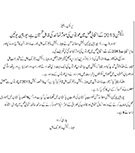 |
22 April, 2013
Aurat Foundation expressed dismay over ‘no women in highest election commission body’.
|
Aurat Foundation has expressed dismay on weak manifestation of women’s participation for general election 2013.
|
| |
|
Read More |
|
|
| |
|
|
|
|
| |
 |
19 April, 2013
Press Release
|
Lahore (PR): A team of European Union Election Observation Mission (EOM) visited Gender Election Monitoring (GEM) Cell, Aurat Foundation, Lahore today and appreciated women’s increased participation in the electoral process for General Election 2013. |
| |
|
Read More |
|
|
/Lhr 19 April PR elecion symbol Urdu - TN.jpg) |
19 April, 2013
Press Release
|
Lahore (PR): Aurat Foundation has expressed surprise on some election symbols as conceived by Election Commission of Pakistan and offered to candidates in the election. |
| |
|
Read More |
|
|
| |
|
|
|
|
| |
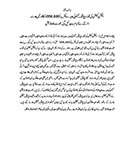 |
18 April, 2013
State institution deliberately depriving women of their basic right to vote:
(AF issued press conference) |
Aurat Foundation Peshawar office issued a press release that due to faulty polling scheme of the Election Commission, around 350,000 women would be deprived of casting their vote.
|
| |
|
Read More |
|
|
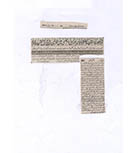 |
18 April, 2013
Women deprived of separate polling station in Torghar, Kohistan, Bajor andOrakzai agency –
(daily Mashreq, Peshawar) |
Women deprived of separate polling station in Torghar, Kohistan, Bajor andOrakzai agency – (daily Mashreq, Peshawar)
|
| |
|
Read More |
|
|
| |
|
|
|
|
| |
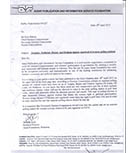 |
18 April, 2013
AF writes letter to CEC, KP, demanding separate polling station women in tribal areas |
Ms Shabina Ayaz, Resident Director, AF Peshawar office, wrote a letter to the Chief Election Commissioner , Provincial Election Commission, KP, and expressed her concerns over joint polling stations in areas like Bajor, Orakzai, Torghar, Kohistan, FR Laki Marwat, FR Kohat, FR Peshawar, and North Waziristan. She demanded the CEC that separate polling stations shall be set up in these areas. |
| |
|
Read More |
|
|
 |
18 April, 2013
Up close and political with Dr Arbab Rahim |
Aurat Foundation and Women’s Action Forum protested against Arbab; PPP wrote to EC to take action against Dr Rahim for using derogatory language against women.
By Hafeez Tunio
Published: April 18, 2013
|
| |
|
Read More |
|
|
| |
|
|
|
|
| |
 |
15 April, 2013
Letter of Protest to CEC against Arbab Raheem |
Anis Haroon, caretaker Minister for Human Rights and Women’s Development (HR & WD), Sindh, on April 15, 2013, had a meeting with Chief Election Commissioner and presented him a letter (below) to protest against the statement by Arbab Raheem against women that women could not be head of state. |
| |
|
Read More |
|
|
 |
15 April, 2013
Article of PDM- VAW watch group member & Sr. Journalist Mr. Ajiz Jamali in counter of Arbab Rahim |
Article of PDM- VAW watch group member & Sr. Journalist Mr. Ajiz Jamali in counter of Arbab Rahim |
| |
|
Read More |
|
|
| |
|
|
|
|
| |
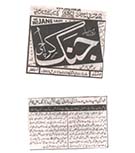 |
11 April, 2013
AF Constitutes Election Monitoring Cell at its Karachi office |
AF Constitutes Election Monitoring Cell at its Karachi office |
| |
|
Read More |
|
|
 |
11 April, 2013
Postal voters shall apply for two ballot papers.
|
| Postal voters shall apply for two ballot papers. |
| |
|
Read More |
|
|
| |
|
|
|
|
| |
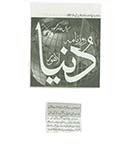 |
08 April, 2013
More than 2 lac women on Election Duty may be deprived of exercising their right of vote: Aurat Foundation |
Lahore (PR): Aurat Foundation, Gender Election Monitoring (GEM) Cell, has urged the women prospective postal voters to apply by 15th April 2013 for postal ballot papers in the respect of National Assembly and Provincial Assembly constituencies in which they are registered as voters |
| |
|
Read More |
|
|
 |
08 April, 2013
Postal Voters should apply for two postal ballot papers for exercising their right of vote in 11 May General Elections. |
Lahore (PR)Explaining the procedure on how to avail facility of postal ballot paper at a workshop organized by Aurat Foundation, it was told that postal voters should send their applications for postal ballot separately |
| |
|
Read More |
|
|
| |
|
|
|
|
| |
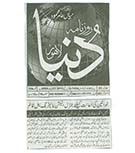 |
02 April, 2013
A F constitutes Election Monitoring Cell at its Lahore office |
A F constitutes Election Monitoring Cell at its Lahore office |
| |
|
Read More |
|
|
|
|
| |
|
|
|
|
* * * * * * * * * *
AF and GCI sign MoU to monitor General Elections 2013
Friday, March 01, 2013
Not only the number and situation of women voters and women candidates would be observed during the upcoming elections, but different aspects of women involved in the administration of elections will also be monitored by national and international monitors.
An MoU in this regard was signed by Director Gender Concerns International (GCI) and Aurat Foundation on Thursday. Under this initiative, 15 international and 50 local observers will monitor the coming elections form gender angle. “We also monitored 2008 elections, but it was on a small level. This time we are planning to make it more organised and effective,” Director Gender Concerns International (GCI) Sabra Bano at a press conference organised to announce a joint collaboration of GCI and Aurat Foundation for the monitoring of 2013 general elections in Pakistan from a gender perspective.
Sabra said GCI is an international gender and development organisation that has conducted a series of unique GEM Missions successfully monitoring elections exclusively from a gender perspective in Tunisia Morocco and Libya. “We will have international observers mostly from all these countries and also other Arab countries so that Muslim countries can learn from the experience of each other,” she said. “Emerging leadership of women in Arab world can learn many lessons from the successes of women right movement in Pakistan.” AF and GCI have joined hands to establish Gender Election Monitoring (GEM) Mission for this purpose.
The prime objective is to ensure that the gender agenda is addressed by the newly elected government and women’s political participation is promoted in post-election Pakistan. According to the Memorandum of Understanding (MoU) between the two organisations, Gender Concerns International and the Aurat Foundation will implement the advancement of the political participation of women in Pakistan by building the capacity of women’s organisations and women in civil society organisations, women Parliamentarians and leaders. Other core steps will include building the capacity of 50 or more domestic observers to monitor the 2013 elections in Pakistan from a gender perspective, strengthening women’s self-organisations and ensuring interactions between women’s organisations and female Parliamentarians. The activities will also include national and international gender lobby and advocacy training. AF and Gender Concerns International have agreed to take joint responsibility for delivering future project outcomes and to maintain the highest standards of professional ethics and conduct in the overall performance of their duties.
Speaking on this occasion, Manager Legislative Watch Group, AF Professor Farkhanda Aurangzeb said that the aim of this initiative is to motivate women for political participation. She said that not only the number and situation of women voters and women candidates would be observed under this project, but the different aspects of women involved in the administration of elections will also be monitored.
* * * * * * * * * *
AF Election 2013 Monitoring Cell – Main Objectives & Activities
- Training regional staff (ten each from 4 regional offices and head office), in collaboration with international organizations, to monitor election ref women’s participation;
- Regional offices coordinating with AF partners / CACs in district to monitor the election activities in their area, and report if women are voting, being facilitated or banned from voting;
- Collecting lists of women candidates on general and reserve seats, comparing the same with the lists last years and analyzing the difference, party-wise;
- Collecting information on Returning Officers (RO) behavior towards women candidates during nomination and scrutiny process;
- Noticing instances of discriminatory, harassing and derogatory remarks by ROs towards women, and if needed submitting or facilitating the complaints to relevant authorities e.g. ECP, PEC etc;
- Collecting information on if political parties are mobilizing women voters and how; if they are facilitating women voters in terms of transport?
- Seeing if political parties are accommodating women candidates in terms of party tickets, reserves seats, and election campaign;
- For voters’ education program, contacting FM radios and meeting radio jockeys to do programmes on voters’ education.
- Monitoring newspapers, social media, e-papers and emails regularly.
- Holding mock polling sessions with rural women voters; and;
- Video clips of first time voters.
* * * * * * * * * *
|
















/Lhr 19 April PR elecion symbol Urdu - TN.jpg)












